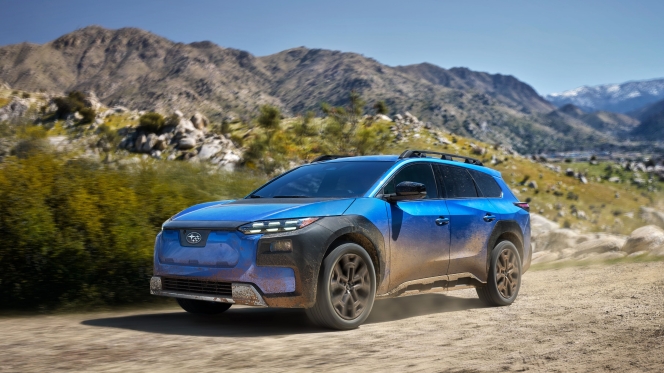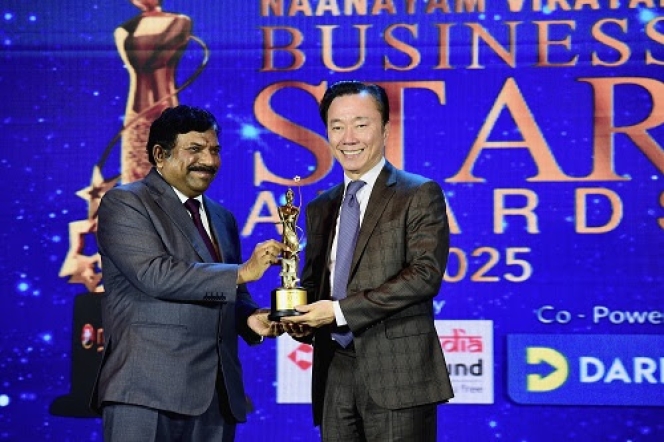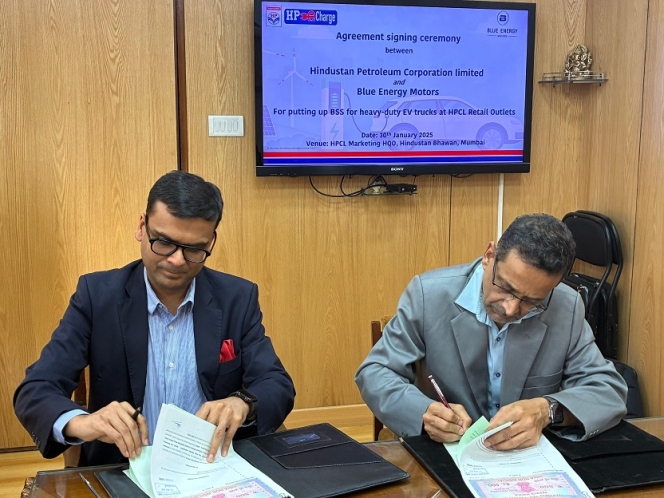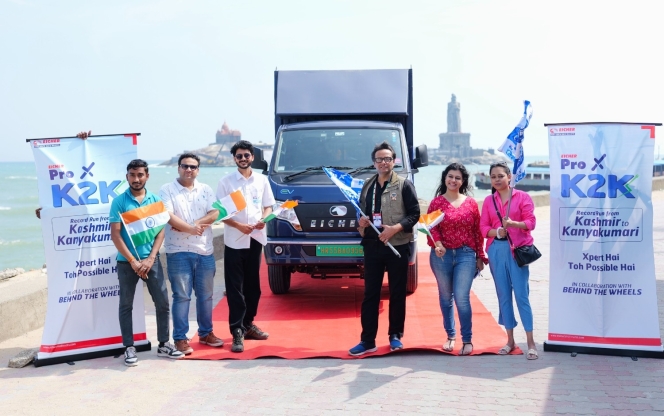Battery Smart Completes 1 Million Paid Swaps
- By MT Bureau
- February 16, 2022

Battery Smart, a battery-swapping network for electric two and three-wheelers, has successfully completed a milestone of one million paid swaps. Besides, the company has expanded to 10 cities in India, including Noida, Gurugram, Faridabad, and Panipat.
The company said it is a significant milestone as it validates the growing usage and acceptance of battery swapping as an innovative clean mobility solution that offers a 40 percent reduction in the up-front investment borne by consumers.
It said with a new battery swapping policy announced as part of Budget 2022-23, battery swapping infrastructure and EV financing are set to receive heightened focus from the government.
Siddharth Sikka, Co-Founder, Battery Smart, said, “Our unique battery-as-a-service model has empowered us to scale our operations at a rapid pace, growing 20X in the last 6 months. Our intelligent battery assignment technology, real-time data, and automated swap stations enable us to minimize wait times and augment drivers’ earnings by upto 100 percent.
Pulkit Khurana, Co-Founder, Battery Smart, said, “We are very proud to announce that we have completed 1 million battery swaps, a testament to India’s rapidly growing acceptance to switch to EVs. The fact that these swaps have been completed by our paying customers, like gig workers and e-rikshaw drivers across 120+ different makes of vehicles, strengthens our belief that an interoperable battery swapping network is the most effective solution, especially for commercial two and three-wheelers.”
Battery Smart’s IoT-enabled batteries on its network and the data generated are being utilised for network planning and ensuring EV users have access to two-minute swaps within a 1 km radius with zero wait time, the release said. With more than 4000 registered drivers on its platform and over 200 Swap Stations live and operational, the company has powered 30 million emission-free km till date, it added. (MT)
Subaru Begins Production Of BEVs At Upgraded Gunma Yajima Plant
- By MT Bureau
- February 04, 2026

Marking a significant step in its electrification strategy, Subaru Corporation has initiated domestic production of Battery Electric Vehicles at its Gunma Yajima Plant. This launch coincides with the finalisation of extensive upgrades to the plant’s production systems, a project commenced in August 2025. Central to these enhancements is a new, flexible assembly line engineered to manufacture the all-new E-Outback alongside traditional petrol and hybrid models within a single, integrated process. This approach leverages Subaru's established expertise in mixed-model production, allowing the company to adapt efficiently to the evolving automotive landscape.
The E-Outback itself represents a key milestone as Subaru's second global BEV, developed through a longstanding alliance with Toyota Motor Corporation. This partnership, celebrating its twentieth anniversary in 2025, has grown to encompass collaborative efforts in development, production and supply chain management. The recent manufacturing advancements are a direct result of deepened cooperation in electrification technologies, combined with continuous refinement of Subaru’s own manufacturing, or monozukuri, capabilities.
Looking forward, Subaru intends to further increase manufacturing flexibility. This focus aims to achieve greater production efficiency and development agility, thereby strengthening the company's ability to respond to market shifts and bolster its overall competitiveness. The Subaru E-Outback is scheduled for introduction in the United Kingdom during Summer 2026, with full specifications to be disclosed nearer the launch date.
- VinFast
- Investor of the Year
- Urban Electric Vehicle of the Year
- VinFast VF 7
- Motor Vikatan Awards 2026
VinFast Wins Dual Honours In India For Investment And Electric SUV
- By MT Bureau
- January 31, 2026

VinFast’s strategic progress in India has been further validated through recent accolades from the influential Vikatan Group media network. The company was distinguished with two significant awards: one recognising its substantial investment commitment, and the other honouring its VF 7 model as the premier urban electric vehicle for 2026. These commendations underscore the brand’s deepening integration into the Indian automotive sector, highlighting both its industrial strategy and its product relevance.
The title of Investor of the Year, conferred by Nanayam Vikatan business magazine, specifically acknowledges VinFast’s landmark commitment to establishing an electric vehicle manufacturing facility in Thoothukudi, Tamil Nadu. This project is noted not only for its scale and strategic clarity but also for its anticipated role in fostering a new industrial corridor, generating employment and bolstering the local supplier network. It aligns with national initiatives like Make in India and reflects confidence in the region’s manufacturing potential.
Concurrently, the VF 7 electric SUV was named Urban Electric Vehicle of the Year at the Motor Vikatan Awards 2026. This recognition from automotive experts underscores the model’s successful adaptation to India’s urban driving conditions, balancing design, performance, safety and comfort. It serves as a testament to VinFast’s product development focus and its localisation strategy aimed at meeting specific market demands.
As a respected media institution in South India with a legacy dating to 1926, the Vikatan Group’s awards carry considerable weight among businesses and consumers. These latest honours add to a growing list of VinFast’s achievements in the market, illustrating the convergence of its investment, manufacturing, and product efforts. Within a short timeframe, the company has employed a long-term strategy encompassing manufacturing, retail, charging infrastructure and after-sales services. Through this comprehensive approach and a focus on sustainable innovation, VinFast is steadily building its brand presence while contributing to India’s transition towards green mobility.
Pham Sanh Chau, CEO, VinFast Asia, said, “Being recognised in two important award categories demonstrates how VinFast is steadily building its position in India, not only through long term investment commitments but also through products developed to match local conditions and user needs. This recognition provides further momentum for us to accelerate implementation, expand the electric vehicle ecosystem, and maintain a long-term partnership with the Indian market.”
B Srinivasan, CEO, Vikatan Group, said, “VinFast India represents the new-age investor – bold in vision, swift in execution and deeply aligned with India’s growth story. By unravelling the true potential of the port city of Thoothukudi, VinFast India has helped create a conducive industrial ecosystem, played a positive role in employment generation and restored the city’s importance on India’s manufacturing map. Their investment is not just capital at work but confidence in India’s future.”
Blue Energy Motors And HPCL Forge Nationwide Pact For Electric Truck Battery Swapping
- By MT Bureau
- January 30, 2026

Blue Energy Motors and Hindustan Petroleum Corporation Limited (HPCL) have entered a strategic partnership to deploy Battery Swapping Stations for electric commercial trucks at select HPCL fuel outlets nationwide. This initiative leverages HPCL’s extensive network of over 24,400 retail locations to create a widespread and convenient energy infrastructure for freight operators. By situating swap stations within established fuelling hubs, the collaboration seeks to make electric mobility a practical and scalable reality for India’s logistics sector.
The core advantage of battery swapping lies in its dramatic reduction of energy replenishment time to under five minutes, minimising vehicle downtime compared to conventional charging. For fleet operators, this efficiency translates into higher vehicle utilisation, improved productivity and more predictable scheduling. Furthermore, a growing and accessible network of swap stations alleviates range anxiety, enabling electric heavy-duty trucks to confidently undertake longer routes and multiple shifts.
As India advances its green transportation goals, this alliance holds significant strategic value. HPCL’s vast retail footprint, which already supports over 5,400 EV charging points under its HP e-Charge brand, offers a ready platform for rapid infrastructure deployment across key freight corridors. Blue Energy Motors, a pioneer in zero-emission freight solutions, brings its expertise in electric commercial vehicles, exemplified by its launch of India’s first electric freight corridor. Together, the companies aim to accelerate electric vehicle adoption by directly addressing the operational needs of commercial fleets, thereby strengthening the long-term development of sustainable freight transport in the country.
- Eicher Trucks and Buses
- VE Commercial Vehicles
- VECV
- India Book of Records
- IBR
- Eicher Pro X
- Vinod Aggarwal
- SS Gill
- Abhishek Chaudhary
Eicher Pro X EV Completes Kashmir To Kanyakumari Journey In 6 Days
- By MT Bureau
- January 28, 2026

Eicher Trucks and Buses, part of VE Commercial Vehicles (VECV), has completed a journey from Kashmir to Kanyakumari using its Eicher Pro X EV.
The record verified by the India Book of Records (IBR), saw the electric vehicle cover over 4,000 kilometres in 6 days under loaded conditions. The run commenced in Srinagar on 20 January 2026 and concluded in Kanyakumari on 26 January 2026, traversing the Himalayas, plains and the Deccan Plateau.
Throughout the expedition, the vehicle utilised public chargers located via the MyEicher App. An adjudicator from the India Book of Records accompanied the truck to monitor route compliance, load, distance and charging stops. The mission served as a demonstration of electric vehicle endurance across diverse altitudes and climates to validate the technology for logistics corridors.
The journey was intended to show that electric commercial vehicles can operate beyond short-haul deliveries. By maintaining performance across hilly and coastal routes, the Pro X EV aimed to establish total cost of ownership (TCO) benefits and maintenance predictability for fleet operators. The successful completion of the route suggests that current charging infrastructure can support long-haul electric freight movement.
Vinod Aggarwal, MD & CEO, VE Commercial Vehicles, said, “For more than four decades, Eicher trucks and Buses have earned customer trust through leadership in fuel efficiency and application-specific engineering. The record-setting performance of the Eicher Pro X reinforces our unwavering focus on application excellence, reliability, and performance, anchored in robust product development and manufacturing capabilities, and enabled by a customer-centric, pan-India commercial and dealer network. I commend the entire Eicher team for achieving these well-deserved records”.
SS Gill, Chief Commercial Officer, VE Commercial Vehicles, said, “By covering the K2K route with a loaded Pro X EV, Eicher Trucks & Buses has proven that electric mobility is no longer restricted to short-haul, ‘last-mile’ deliveries. We are not just setting records, but through the strength of our service network and extensive dealer set-up, we are demonstrating that our EV technology is commercially viable, reliable, and has the range to serve as the backbone of India’s green logistics corridors”.
Abhishek Chaudhary, SVP – SCV Sales & Marketing, VE Commercial Vehicles, said, “The Eicher Pro X EV was put to the ultimate test – covering over 4000 kilometres across diverse climates and challenging altitudes. With this recognition from the India Book of Records we’ve moved beyond our own stringent testing benchmarks to real-world validation - Demonstrating that Eicher Pro X EV is a dependable partner for logistics movement across varied operations in India”.








Comments (0)
ADD COMMENT